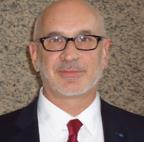Invited Speaker---Dr. Roko Andricevic

Dr. Roko Andricevic
Professor, Faculty of Civil Engineering, Architecture and Geodesy, University of Split, Croatia
Roko Andricevic, Ph.D. is a full professor since 2003 at the Faculty of Civil Engineering, Architecture and Geodesy, University of Split. He obtained his Ph.D. from Civil and Environmental Engineering Department, University of Minnesota, USA, in the subject area of water resources management and environmental science. He spent two years as visiting scientist at the Stanford University and later employed as assistant and associate professor at the Desert Research Institute, University of Nevada Systems in Las Vegas and Reno. After returning to the Croatia in 2001, he was nominated the public office as the Assistant Minister in the Ministry of Environmental Protection and Physical Planning, Republic of Croatia. From 2006-2008 prof. Andricevic was serving as a Dean of Civil Engineering Faculty at University of Split and from 2008-2014 was Vice-rector for science and international affairs at the University of Split. From 2014-2016 prof Andricevic was nominated as Vice-minister of Science and education in the Croatian Government. Prof Andricevic interest is in water resources management, environmental science and environmental risk assessment. He is serving as international expert for EU related projects and authored more than 70 scientific papers published in international journals and one book.
Speech title: Health risk assessment of coastal waters using spatially integrated concentration and carrying capacity concept
Abstract: The riverine transport is the primary mechanism for direct impacts of land-based anthropogenic activities on coastal resources and the marine environment. Coastal recreational waters are receiving an intense pressure, which is the result of the increasing economic development affecting the marine ecosystem. In many parts of the world, coastal ecosystems are experiencing unfavorable changes in water quality, an increasing frequency of eutrophication events, changes in marine biodiversity, faecal pollution, and other impacts questioning the sustainability and safety of coastal water bodies. Recreational potential of a beach depends on its health status, which is affected by presence of pollutants or other sources of infection. This presentation is aimed in providing a screening model for helping decision makers to assess sustainable strategy for coastal zone management. Quantitative microbial risk assessment (QMRA) of gastrointestinal illness associated with the recreational exposure to marine water in the city of Rimini (Italy) is conducted. Exposition is analysed through a stochastic physically based model and daily risk is determined by dose-response relationship. The concept of Carrying Capacity is introduced to quantify the number of beach resort users that can be sustained with a certain risk threshold. The presented methodology provides a tool for decision makers to solve the economic and health risk trade-off between resources needed for infrastructure improvement and tourism development under the sustainable environmental policies.



